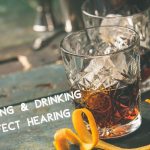A career as a rock star may afford fortune and international fame, but it also has consequences that extend beyond the lights. Hearing loss is a common medical condition that so many musicians suffer from.
In a January 2018 interview with BBC Radio, Eric Clapton shared that he was going deaf. In March, front man Roger Daltrey of The Who told fans at a concert that he is “very, very deaf” and advised young people following in his footsteps to invest in earplugs. In April of the same year, Huey Lewis and the News canceled its 2018 tour because Lewis told fans that he “can’t hear well enough to sing.”
In the growing list of rock ’n’ roll musicians who have suffered from hearing loss over their career, you may be surprised to find that classical musicians are also afflicted with noise-induced hearing loss.
A Violist’s Story
Betty Hauck, a classically trained violist, retired from professional music when she was 65 because she could not hear well enough to perform any longer.
“I completely turned my back on music. I didn’t want to have anything to do with music whatsoever. If I couldn’t play up to the level I was used to, I wasn’t going to do it,” she says.
Her long career included performances at the White House for the Kennedys, with a string quartet with Yo-Yo Ma, and in the Middle East. But during once performance of a Bach cantata at the Emmanuel Church in Boston, she said she could not follow along with the music.
She recalls quitting at that instant.
“I quit on the spot. I didn’t want to put any of my colleagues in the very awkward position of telling me that it was time to stop playing.”
The Research
It is difficult for Hauck to be certain that her career in music led to her moderate-to-severe hearing loss, but there is a known scientific connection. Researchers have found that years of exposure to an orchestra can take their toll on your hearing health.
One German study shows that professional musicians were almost four times as likely to experience noise-induced hearing loss. Another found that damaged hearing was prevalent in nearly 60 percent of classical musicians.
Marshall Chasin, an audiologist who works with musicians in Toronto, says classical musicians are more likely to practice for long hours, teach music lessons, and also perform regularly.
“It turns out classical music is more damaging than rock and roll. If you take the dose that they get — the number of hours per week playing — for a classical musician, it’s much, much greater,” he says.
For most musicians—including Betty Hauck—the hearing loss was gradual. And she was not prepared to deal with it.
She practiced with hearing aids for a while, and then used them during her performances, but in the end, they were not enough. She gave up her music and did not touch her viola that she had owned since 1969.
“I was depressed and I was in denial about what a huge loss it had been,” Hauck says. “I had decided I was going to treat my hearing loss as a neutral event, kind of take a Buddhist approach and think it’s neither good nor bad. It’s just something that’s happened to me.”
It was not, however, a neutral event. It took three years for Betty to accept her hearing loss, the end of her career, and the music that had been such an integral part of her life. Then, she began working with an auditory trainer and meeting people who also suffered disabling hearing loss.
“I started grieving,” she says. “And as a result of that, I discovered the sweetness on the other side.”
Protecting Your Hearing
When we think about our favorite bands and musicians, we rarely think about how the music can take a toll on their health. Hearing loss effects many classical musicians in esteemed orchestras to some of the biggest artists in music history. To name a few: Sting, Neil Young, Phil Collins, and Ozzy Osbourne. Also, a relatively younger Chris Martin from Coldplay is proof that hearing loss is a medical condition that affects people across all ages.
It is both good advice and irony at work that the titular character in The Who’s “Tommy,” Roger Daltrey, recommends earplugs. It is the same advice that an audiologist or board-certified hearing instrument specialist would give when exposed to loud noise for prolonged periods of time.






